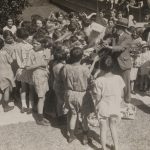Find and Connect has recently been invited to a number of conferences, some Australian, some international, to talk about the web resource and what we do. To help set the scene for these talks, we start by acknowledging that archives aren’t neutral, that they are made up of the biases and power structures of the societies and organisations that they are a part of, and that they are influenced by the policies, processes and individuals who work in them.
This is of particular importance to Care Leavers, the subject of records that were created without their knowledge, consent or input; by those who were often – if not outwardly hostile – then ambivalent about their needs.
The myth of neutrality in the archive relates to Care Leavers in a number of ways:
Archives are not neutral: records of children in the out of home care system were  created by workers for compliance and reporting reasons, rather than out of any concern for the child, or with any thoughts that the child would one day get access to them.
created by workers for compliance and reporting reasons, rather than out of any concern for the child, or with any thoughts that the child would one day get access to them.
Archives are not neutral: many of the records are cruel, judgemental and depersonalising, and exist to justify government policies of continued removal of children from their families and sustaining the child welfare system.
Archives are not neutral: Many records about Care Leavers were destroyed in the past, because organisations didn’t think they were important or that anyone outside of the organisation would ever have an interest in them.
Archives are not neutral: Many people still face barriers to accessing the records about them, and have to navigate complex legal environments to gain access. On the flip side, we have seen what a difference it makes if the organisation responsible for providing access is compassionate and supportive of full records release.
Archives are not neutral: What about the archives of tomorrow, made up of records being created today? At the National Summit: Setting the Record Straight for the Rights of the Child, we heard from young people who had recently exited the out-of-home-care system. They were still not told about how to access their records, who else had access to their files, or what those files contained.
Creating neutral archives is an impossible task, given our cultural influences and the way those influences, structures and beliefs change over time. We cannot then, as a product of our time in history, advocate attempting to “make them neutral”. Instead, we need to be more open about the policies, biases and forces shaping the archives and make these much more explicit to users and creators of archives.
While you’re here, you can really make a difference to the future of www.findandconnect.gov.au by taking a few minutes to do our site survey. We’ll use your response to design an even better Find & Connect







Frank Golding
June 8, 2018 3:47 pmThis is seriously good! I reckon you hit the nail right on the head in the sentence: “This is of particular importance to Care Leavers, the subject of records that were created without their knowledge, consent or input; by those who were often – if not outwardly hostile – then ambivalent about their needs.” It would be a revolution if young people in care today routinely knew that records were being made about them, they consented and had input into the making of them.